Residents of five mobile home parks in Buncombe and Henderson counties rely on water systems that exceed the limit of PFAS compounds, known as forever chemicals, putting them at greater risk of cancer and other illnesses, Asheville Watchdog reports.


Residents of five mobile home parks in Buncombe and Henderson counties rely on water systems that exceed the limit of PFAS compounds, known as forever chemicals, putting them at greater risk of cancer and other illnesses, Asheville Watchdog reports.
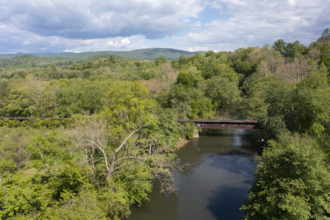
After several years of litigation, a recent court ruling has required the federal government to pay over $5 million to 164 landowners along the proposed 19.4-mile Ecusta Trail. Compensation to individual property owners ranges from $223 to $191,061. The multiuse greenway, scheduled to be completed in 2028, will run along an unused railway corridor connecting […]

The legal complaint, which focused on the 15-acre timber harvest, argued that the Southside Project is inconsistent with the U.S. Forest Service’s new plan to manage North Carolina’s Pisgah National Forest and Nantahala National Forest, which the agency released in February 2023.

Asheville-area health professionals are seeing itchy, sniffling allergy sufferers up to nine months of the year.

‘We haven’t really seen any widespread emergence of the periodical cicada so far, but we think it’s really going to be isolated to very small areas in southern Buncombe and around the Arden area and in Fairview,” says Owen.
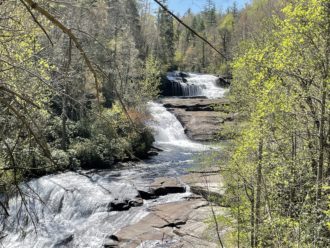
DuPont State Recreational Forest attracted more than a million visitors in 2023, something nobody expected when the site opened nearly 30 years ago. To keep up with the growth, forest officials are about to enact some major changes.
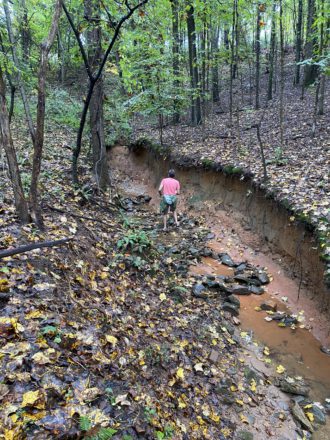
When it rains on the campus of Asheville-Buncombe Technical Community College, stormwater pours off its plethora of parking lots into the neighborhoods, forest and French Broad River below, taking pollutants with it. Now, the community college, which sits at the headwaters of one of three primary tributaries in the Central Asheville Watershed, is working to reduce the volume of rainwater that flows from its campus.

The Forest Service finalized its forest plan for Western North Carolina’s two national forests in Feb. 2023 after a decade-long process that included thousands of public comments and the commitment of dozens of groups of stakeholders.

After 37 years, George Briggs will step down from his leadership role at The N.C. Arboretum. Drake Fowler will replace him in August. Plus: “Blue Ghost” fireflies return; Kid’s Merchandise Design Contest is now underway; and more!

Kate Epsen, who serves as the chair for the Wilma Dykeman Legacy’s news committee on environmental integrity, is currently seeking community input on environmental justice. Photo courtesy of Epsen

Sarah Jones Decker, a volunteer at Carolina Mountain Club, discusses the joys of being outside with like-minded hikers.

In February, Mountain BizWorks’ MADE X MTNS partnership, which seeks to expand WNC’s outdoor industry, released a study that noted outdoor activities such as backpacking, day hiking and vehicle camping generated an economic output of $4.9 billion per year for the region and resulted in 48,000 full-time jobs.
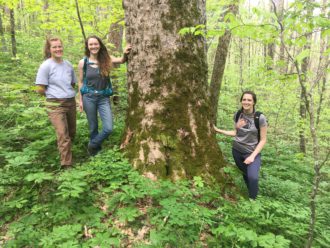
Asheville-based nonprofit MountainTrue and others await responses from the U.S. Forest Service after filing a flurry of legal actions since the federal agency finalized its Pisgah-Nantahala Forest Plan last year.

Conserving Carolina’s fifth annual Habitat at Home spring photo contest is underway. Plus: Hendo Earth Fare returns to Hendersonville; G5 Trail Collective adds 10 new miles; and more!
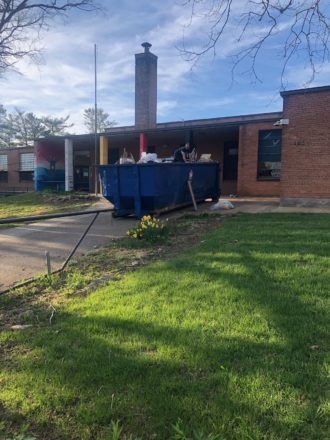
The biggest sting seemed to be the timing: The dumpster in front the former Asheville Primary School arrived one day after the Asheville City Board of Education board voted to close Montford North Star Academy.

The site is only 15 acres. But the lawsuit could have dramatic implications for future timber cutting in the region.

The Hickory Nut Gorge green salamander, found exclusively in a 14-mile-long gorge southeast of Asheville, is being considered for listing under the Endangered Species Act by the U.S. Fish and Wildlife Service. Scientists estimate there are only a few hundred of them left on Earth and populations have declined steeply in the past 20 years.

Conservation biologist JJ Apodaca and his locally based organization, Tangled Bank Conservation, recently received a $100,000 prize to further develop genetic sequencing techniques that will help save three of the most poached turtle species in the United States.
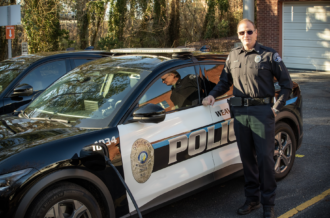
Small municipalities throughout Western North Carolina see electric vehicles as the future of transportation in their communities, but the specific approach varies from town to town.

Asheville’s wellness culture is touted nationwide for its outdoor lifestyle and fresh mountain air. But less well known are the mycological wellness opportunities — that is, medicinal mushrooms — in our refrigerators and cupboards.

“RiverLink is the only conservation organization focused exclusively on the French Broad River and its tributaries,” says Lisa Raleigh, the nonprofit’s executive director. “We operate three programs that include water resource management, land conservation and youth education.”